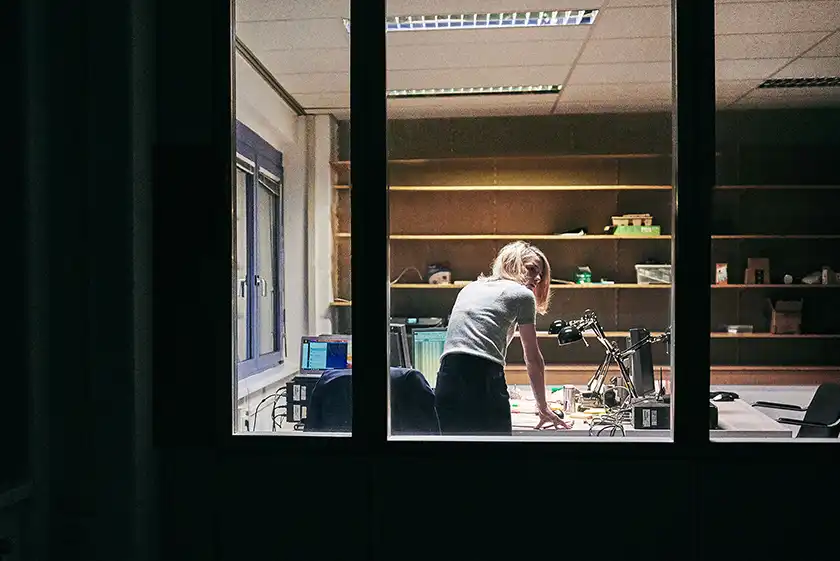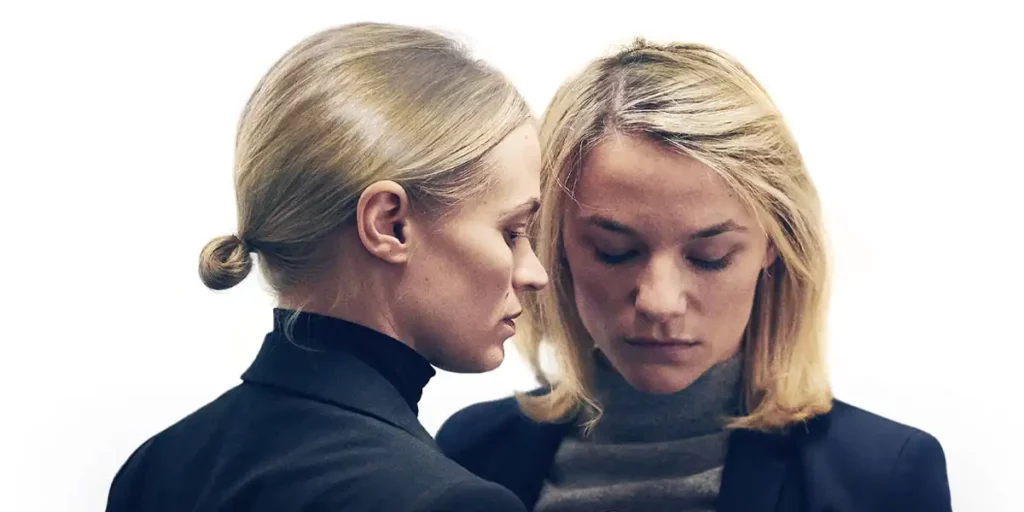With acerbic accuracy, The Ground Beneath My Feet devastatingly depicts the disturbances that working women must withstand when prioritizing the professional over the personal.
At the start of The Ground Beneath My Feet, Valerie Pachner’s Lola (A Hidden Life) seemingly has it all: a profitable profession as a top-tier business consultant, a fiery and flirtatious fling with her beautiful boss, and an energetic and efficient exercise routine that molds her body into a well-oiled machine. With so much emphasis on her employment, Lola has little time to devote her attention elsewhere, and she views most personal matters as paltry and purportless. However, when Lola’s sister Conny (Pia Hierzegger, of Wild Mouse), her only living family member, attempts to commit suicide and Lola is called upon to participate in Conny’s physical and mental recovery, the formerly firm fences that Lola had kept between her professional practice and her private life come crashing down.
While that simplistic summary of this stirring and sophisticated story doesn’t even begin to hint at the tragic, tangled themes that arise as this tale trods on, it’s to writer-director Marie Kreutzer (The Fatherless, We Used To Be Cool)’s credit that she manages to continually add complexities and complications to this chronicle without ever letting the plot lose its purity. Though The Ground Beneath My Feet occasionally adopts some attributes of the “psychological thriller” genre (particularly in the film’s second act, as Conny’s behavior grows more and more bizarre and her delirious demands start to dampen Lola’s ability to concentrate on any other concerns), Kreutzer never allows the film slip into second-rate schlock, as she always keeps the drama as grounded as possible – gloriously so. Whereas lesser filmmakers may have exploited Lola and Conny’s occasionally erratic emotions, Kreutzer holds their humanity in the highest regard, and she stresses the sincerity and substance of their sisterhood above all else.
Kreutzer’s own feminine identity influences Lola and Conny’s interactions as well, as all of their activities feel absolutely authentic, and she allows these characters to be both cryptic and coarse without constriction. Only a female filmmaker could make Lola and Conny’s messy, multifaceted mannerisms emerge as effortlessly as they do, and Kreutzer truly can’t be praised enough for her powerful perception of her protagonists (especially as the plot grows more perplexing).

Because of Kreutzer’s thoughtful treatment of both her layered leads and The Ground Beneath My Feet’s sensitive subject matter (including topics revolving around mental illnesses and gender roles), the scathing social commentary at the core of this story succeeds splendidly. At a corporation with male-dominated management, Lola has had to adapt to this environment by eliminating “extraneous” emotions and strengthening her stoicism in order protect her professional poise. When she is sent for to support Conny once more, she is forced to face familial feelings that she had previously phased out, and these sudden stressors start to curb her capability to preserve her patience and passivity in the workplace. As coworkers start to commentate on the peculiarities in her presentation, Lola grows steadily more self-conscious, and her mania magnifies.
Furthermore, she begins receiving regular phone calls from a crazed Conny, who constantly makes alarming accusations against the mental hospital where she is being held (alleging that she is being abused by the center’s assistants, a la One Flew Over the Cuckoo’s Nest). However, when Lola contacts the hospital to complain, they maintain that Conny has never used their phone services, nor does she possess a mobile device of any kind. Appalled, Lola is compelled to confront the fact that she’s either experiencing horrid hallucinations as a result of being obscenely overworked and greatly guilt-ridden, or, in a more startling scenario, she may have inherited the schizophrenia that plagues Conny (and their mother before her).
With these disturbing developments, Kreutzer is able to definitively denounce oppressive organizations that “encourage” employees to stamp out sentiment in order to achieve and attain acclaim (especially when these words of “advice” are most often aimed at women in the workplace). Though Kreutzer’s script incorporates the aforementioned traits of the thriller genre to intensify the film’s intrigue, the basic obstacles that Lola must overcome are realistic and relatable for just about every female viewer; one can’t help but feel ferociously flustered as the previously prized Lola is taken off of projects and has her commitment called into question simply after one moment of extreme emotional expression to her boss (in an attempt to alleviate the anguish she feels over her sister’s condition).
Aside from coping with her company’s waning confidence in her competence, Lola must also grapple with the guilt and grief she feels over Conny’s suicide attempt; was her effortful estrangement to blame for her sister’s suicidal ideation? Is Lola’s endless engrossment in her employment responsible for Conny’s cheerlessness? Could she have thwarted this tragedy by not shirking her sisterly duties? The Ground Beneath My Feet abstains from offering any easy answers to these questions, and as the film sails into its second and third acts, this ambiguity only amplifies. By the disastrous denouement, audiences will only be capable of mustering up anger at a system that stalls sensitivity and honors emotional indifference (which is more easily achieved by men) – and that’s exactly what Kreutzer wants.
Throughout all of this turmoil, Pachner steadies The Ground Beneath My Feet with admirable assuredness. At the opening of this odyssey, prior to all the later pandemonium, Pachner plays Lola as a cold cipher in control of every component of her life, but there’s just enough edge behind Pachner’s eyes to hint at the turbulence tucked within. As Lola’s sorrow spills out, Pachner never descends into trite theatrics, always portraying Lola as a woman at war with herself and her emotions, attempting to stave off spasms of sadness while simultaneously submitting to this spectacle. It’s a tricky tightrope act – illuminating Lola’s intentional impassivity while also giving air to her inherent agony – but Pachner beautifully balances the dueling dynamics.
Though Hierzegger’s Conny is much more of a supporting member of the cast throughout The Ground Beneath My Feet, she sells her scenes spectacularly and makes the most of every minute of screen time. We only truly see Conny in her shattered state as a shadow of her former self, but Hierzegger lets just enough light shine through to clue us in on Conny’s character pre-admittance to the mental hospital and to highlight hints of her history with Lola. Nevertheless, Conny is a ticking time-bomb at all times, and she often unexpectedly howls away in hysterical histrionics (which Hierzegger handles heroically). And yet, while these outbursts are outrageous, they are never overblown, indicating Hierzegger’s incredible insight into the mental illness that she is imitating.
The Ground Beneath My Feet is a sumptuous slow burn, which may not seem inviting to audiences expecting more upfront excitement and energy in what is described as and advertised as a pulsating “psychodrama”. However, to those intrigued by this incendiary indictment of modern-day corporate culture and its effect on employees – particularly for females – there are rewarding thematic riches that await.
The Ground Beneath My Feet is now available to watch on digital download.

